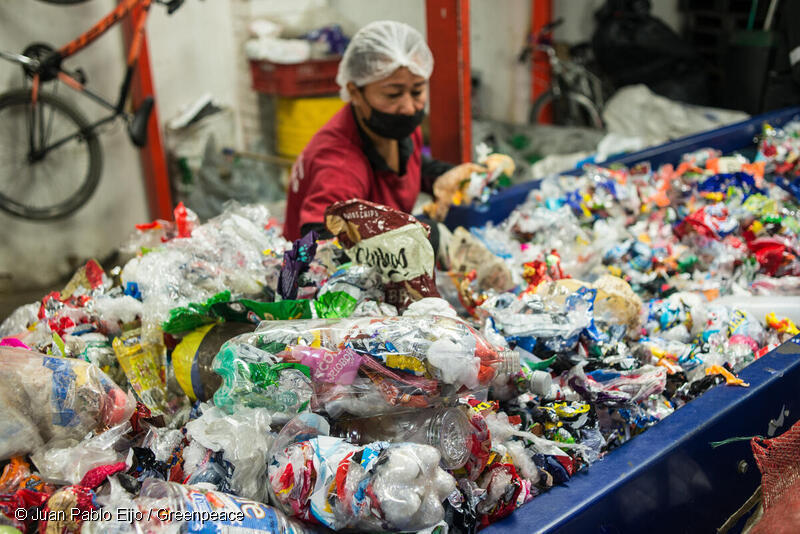October 12, 2023
(press release)
–
The data is clear. Global plastic production doubled from 2000 to 2019, reaching 460 million tonnes (Mt) per year and without action is anticipated to nearly triple by 2050 and projected to consume 13% or more of Earth’s remaining carbon budget to keep warming below 1.5°C. This uncontrolled production of plastics is accelerating the triple planetary crisis – climate change, pollution and biodiversity loss, threatening human health at an unimaginable scale, and exacerbating racial, gender and economic inequality across the globe. Waste Management and Recycling in Bogotá, Colombia As we head into the third round of international negotiations for a global Plastics treaty in Kenya, global leaders must step up to the reality that the only way to address the plastics crisis and avoid the worst effects of the climate emergency is to set ambitious rules that significantly reduce the amount of plastics produced. World leaders have an opportunity to be ambitious and if they fail, we will all lose. Reducing plastic production by at least 75% to avoid the worst of the climate crisis If we only look at the plastics crisis through a climate lens, the best available modeling (Eunomia and Pacific Environment) tells us that cutting plastic production by 75% by 2050 will be required to keep warming to 1.5 C and prevent the most dire impacts of a rapidly warming planet. The more recently released Global Stocktake on climate change states that the window for keeping warming to 1.5 C is rapidly closing, and offers yet another stark wakeup call – the world needs to do much more, much faster to protect life on earth. If your bath was overflowing, you wouldn’t reach for a mop, you’d turn off the tap. This is what we need to do with plastic Setting a global target to cut plastic production by at least 75% by 2040 answers this call for bold, ambitious international action. Doing so will not only help countries to meet their climate goals, it will create jobs, unlock new levels of innovation and advance real solutions towards low-carbon, toxic-free, reuse-based economies. A treaty to defend the interests of affected communities and workers, not the fossil fuel industry Unsurprisingly, fossil fuel companies are using the climate playbook to stifle ambition and convince governments to define what’s possible by what brings them short-term profit. Several of the high-profile reports meant to inform treaty negotiations come from a consultant with ties to the oil and gas industry and set the world up for failure by protecting business as usual and downplaying the need to address plastic production directly. World leaders must reject this fundamentally defeatist approach. With decades of experience from climate negotiations, we know that we need ambitious, globally agreed rules that reduce plastic production and accelerate a just transition prioritizing the interests of those who have done the least to cause this crisis but are paying the highest price. A Greenpeace Turkey campaigner sits behind a banner saying ‘Wasted Land’ and investigates a waste pile in Seyhan, Adana Province, Turkey. In February 2022, a report released by Greenpeace Mediterranean showed how Turkey’s soil, air, and water are bearing witness to the environmental and human health costs of Europe’s plastic waste exports. Countries like the UK and Germany, who ship their plastic rubbish overseas where it’s dumped and burned, are leaving a toxic trace in Turkey’s fertile soil. This damage is irreversible. The table is set. Now the real work must begin The recently released ‘Zero Draft’ of the treaty includes the basic legal architecture required to set an ambitious, global reduction target on plastic production. The table is set and what’s needed more than anything is the courage to be ambitious. The Global Plastics Treaty is a once-in-a-generation opportunity to solve the plastics crisis. Together with our allies at the Break Free from Plastic movement, and the millions of people who are taking action, we can achieve an ambitious Global Plastics Treaty that will turn off the plastics tap and finally, end the age of plastic.
To stay below 1.5°C for our climate, an ambitious #PlasticsTreaty is essential to cut plastic production by at least 75%!
👉 https://t.co/XkgSeqx3kp pic.twitter.com/p9Ey4T8E1K
— Greenpeace International (@Greenpeace) September 21, 2023
* All content is copyrighted by Industry Intelligence, or the original respective author or source. You may not recirculate, redistrubte or publish the analysis and presentation included in the service without Industry Intelligence's prior written consent. Please review our terms of use.




